Costa Mesa, CA – Broadcom’s patent attorneys filed a patent infringement complaint at the Federal District Court in Santa Ana, accusing SiRF Technology of infringing four of Broadcom’s patents. Icon states that it is “an award-winning innovator in the field of exercise equipment and provides a variety of consumer products.” Icon is the assignee of the invention covered by U.S. Patent No. 5,104,120, titled “Exercise Machine Control System.” Icon is also the owner by assignment of the invention covered by U.S. Patent No. 6,019,710, titled “Exercising Device With Elliptical Movement.” The first, U.S. Patent No. 7,310,104, is entitled “Graphics Display System with Anti-Flutter Filtering and Vertical Scaling Feature.” The next, U.S. Patent No. 6,501,480, is entitled “Graphics Accelerator.” The third, U.S. Patent No. 6,747,497, is entitled “High-Speed, Wide Bandwidth Phase Locked Loop.” And finally, U.S. Patent No. 5,525,127, is entitled “Unique Word Detector and Method for Detecting a Unique Word Within One of Several Windows Offset in Time.” The complaint alleges that SiRF sells chips which provide GPS functionality for devices and enables GPS devices to support graphics and video processing. The case is titled Broadcom Corporation v. SiRF Technology, Inc., SACV08-546 AG (C.D. 2008).
Oxnard Trademark Attorneys File Trademark Infringement and Lanham Act (15 U.S.C. 1125) Complaint To Protect Athena Cosmetic’s Trademarks, Including Revitalash
Oxnard, CA – A trademark infringement and Lanham Act §43(a) unfair competition (15 U.S.C. 1125) lawsuit was filed by attorneys for Athena Cosmetics, Inc., at the Federal District Court in Santa Ana. Athena is the owner of USPTO trademark registrations for the Revitalash, Athena, and Athena Cosmetics trademarks.
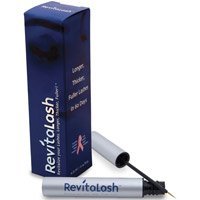 The complaint alleges that Defendants incorporated under the confusingly similar name of Athena Bioscience, also using it as a trademark, in addition to using the confusingly similar trademark of Athena Lash Serum. The complaint further asserts causes of action for unfair completion under Cal. Bus. & Prof. Code §17200, intentional interference with prospective economic advantage, intentional interference with contract, and declaratory relief under 28 U.S.C. §2201 as to the ownership of the trademarks. The case is titled Athena Cosmetics, Inc. v. Athena Bioscience, SACV08-0532 AG (C.D. 2008).
The complaint alleges that Defendants incorporated under the confusingly similar name of Athena Bioscience, also using it as a trademark, in addition to using the confusingly similar trademark of Athena Lash Serum. The complaint further asserts causes of action for unfair completion under Cal. Bus. & Prof. Code §17200, intentional interference with prospective economic advantage, intentional interference with contract, and declaratory relief under 28 U.S.C. §2201 as to the ownership of the trademarks. The case is titled Athena Cosmetics, Inc. v. Athena Bioscience, SACV08-0532 AG (C.D. 2008).
Santa Ana, CA – Trademark, Patent, and Trade Dress Attorneys For Oakley Filed Design Patent Infringement, Trade Dress Infringement, and Trademark Lawsuit To Stop Copying Of Oakley’s Protected Sunglasses/Eyewear
Santa Ana, CA – Oakley’s trademark and patent attorneys filed a patent infringement, trade dress infringement, and trademark infringement complaint at the Federal District Court in Santa Ana to stop copying of protected sunglasses/eyewear. Oakley registered its stylized ellipsoid “O” logo trademark with the U.S. Patent and Trademark Office (“USPTO”) for use on goods in International Class 9 (e.g. eyewear, sunglasses,and goggles). Oakley also registered its stylized ellipsoid “O” logo as used on the side of a sunglass ear-stem with the USPTO. As further protection, the USPTO issued U.S. Patent No. D556,818, titled “Eyewear Components,” which protects the design and ornamentation embodied by Oakley’s Gascan sunglass.
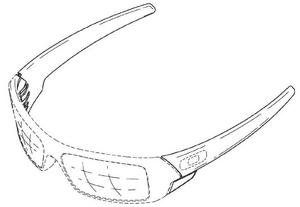 The complaint alleges that Outlook Eyewear has “advertised and sold counterfeit products bearing a reproduction or copy of the trademarks, which mark is an unauthorized reproduction of Oakley’s famous ellipsoid “O” mark intended to cause a likelihood of confusion or to deceive or otherwise capitalize upon Oakley’s goodwill.” The complaint also alleges that Oakely has obtained trade dress protection in the design of its Gascan line of sunglasses because of the expenditure of large sums of money in its promotion and, as a result of which, it “has become, through widespread public acceptance, a distinctive designation of the source of origin of goods offered by Oakely and an asset of incalculable value as a symbol of Oakley and its quality goods and good will.” In addition to preliminary and permanent injunctions, Oakley seeks monetary damages and its attorneys’ fees. The case is titled Oakley, Inc. v. Outlook Eyewear Company, SACV 08-00439 JVS (C.D. Cal. 2008).
The complaint alleges that Outlook Eyewear has “advertised and sold counterfeit products bearing a reproduction or copy of the trademarks, which mark is an unauthorized reproduction of Oakley’s famous ellipsoid “O” mark intended to cause a likelihood of confusion or to deceive or otherwise capitalize upon Oakley’s goodwill.” The complaint also alleges that Oakely has obtained trade dress protection in the design of its Gascan line of sunglasses because of the expenditure of large sums of money in its promotion and, as a result of which, it “has become, through widespread public acceptance, a distinctive designation of the source of origin of goods offered by Oakely and an asset of incalculable value as a symbol of Oakley and its quality goods and good will.” In addition to preliminary and permanent injunctions, Oakley seeks monetary damages and its attorneys’ fees. The case is titled Oakley, Inc. v. Outlook Eyewear Company, SACV 08-00439 JVS (C.D. Cal. 2008).
Los Angeles, CA: Patent Infringement Lawsuit Filed By Exclusive Licensee Of Neurography System Patent Against Pasadena Based Medical Companies
Los Angeles, CA – A patent infringement lawsuit was filed by Neurographix, an exclusive licensee of the patent at issue, in the Federal District Court in Los Angeles, accusing Pasadena based Oak Tree Medical Corporation of infringing on the licensed patent. The University of Washington is the owner by assignment of the invention covered by U.S. Patent No. 5,560,360, entitled “Image Neurography and Diffusion Anisotropy Imaging.” Pursuant to a first licensing agreement, the University of Washington granted an exclusive license to the ‘360 patent to the Washington Research Foundation. The foundation, in turn, granted an exclusive license to the ‘360 patent to Neurografix.
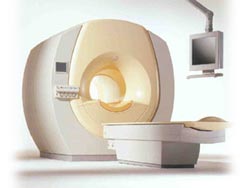 The complaint alleges that defendants Oak Tree Medical and Dr. Jay Tsuruda are infringing the ‘360 patent by making, using, importing, offering for sale, and/or selling products and services which provide peripheral nerve MRI imaging services. It is alleged that “Defendants knowingly, willfully, and deliberately infringed and, on information and belief, continue to infringe the ‘360 Patent in conscious disregard of [Neurografix’s] and [Washington Research Foundation’s] rights, making this case exceptional within the meaning of 35 U.S.C. §285 and justifying treble damages pursuant to 35 U.S.C. §284.” Plaintiffs also seek both preliminary and permanent injunctions against further alleged infringement. The case is titled Neurografix et al. v. Oak Tree Medical Corporation et al., CV 08-02923 CAS (C.D. Cal. 2008).
The complaint alleges that defendants Oak Tree Medical and Dr. Jay Tsuruda are infringing the ‘360 patent by making, using, importing, offering for sale, and/or selling products and services which provide peripheral nerve MRI imaging services. It is alleged that “Defendants knowingly, willfully, and deliberately infringed and, on information and belief, continue to infringe the ‘360 Patent in conscious disregard of [Neurografix’s] and [Washington Research Foundation’s] rights, making this case exceptional within the meaning of 35 U.S.C. §285 and justifying treble damages pursuant to 35 U.S.C. §284.” Plaintiffs also seek both preliminary and permanent injunctions against further alleged infringement. The case is titled Neurografix et al. v. Oak Tree Medical Corporation et al., CV 08-02923 CAS (C.D. Cal. 2008).
Trademark And Cybersquatting Attorneys For Buy.com File Trademark Infringement, Lanham Act Unfair Competition And Cybersquatting Lawsuit To Stop Alleged Cybersquatter Of Domain Name In Santa Ana, CA
Santa Ana, CA – Trademark and anti-cybersquatting attorneys for Buy.com filed a trademark infringement, Lanham Act unfair competition, cyberquatting, and California Business and Professions Code §17200 lawsuit in Federal District Court in Santa Ana against an alleged cybersquatter of the buys.com domain name. Buy.com has been an e-commerce company since 1997 and has operated the website buy.com to market and sell products since at least 1998. Buy.com owns three relevant trademarks related to its business, which marks are registered on the Principal Register of the USPTO. Buy.com alleges that “throughout the past 10 years, Plaintiff has used the buy.com trademarks to build and establish considerable goodwill in the online retail industry. In fact, through the use of these trademarks, Plaintiff is universally recognized as a leader in e-commerce and as a provider of superior goods and services, and is visited by over 5 million US shoppers each month.”
The complaint continues, “Defendant is the registrant of the Internet domain name buys.com [with an additional “s”]. Defendant uses the buys.com website to profit from the Buy.com trademarks. Specifically, Defendant’s buys.com website contains numerous advertisements for and/or hyperlinks to a variety of products and services that compete directly with Plaintiff, such as eBay and Dell. Upon information and belief, Defendant receives a payment when Internet users click on one or more links or advertisements on the buys.com website . . . By using the buys.com domain name that is confusingly similar to Plaintiff’s trademarks Defendant was and is creating, or attempting to create, an association between the buys.com domain name and Plaintiff, and has frustrated or diverted Internet traffic intended for Plaintiff.” The complaint asserts the following causes of action: (1) Federal trademark infringement under 15 U.S.C. § 1114; (2) False designation of origin and unfair competition under section 43(a) of the Lanham Act, 15 U.S.C. § 1125(a); (3) Cybersquatting under the Lanham Act, 15 U.S.C. § 1125(d); (4) California common law unfair competition; (5) Unfair competition under California Bus. & Prof. Code § 17200; (6) Common law unfair competition; and (7) Declaratory Judgment under 28 U.S.C. §2201. The case is titled: Buy.com, Inc. v. Webmagic Ventures, LLC, SACV08-00510 JVS (C.D. Cal. 2008).
Los Angeles, CA: Trademark Attorneys For Chiropractor File Trademark Infringement, Lanham Act 43(a) Unfair Competition, And False Advertising Lawsuit Over Google Adwords Used By Competitor
Los Angeles, CA – Chiropractor Dr. Jeffrey James’ trademark attorneys filed a trademark infringement, Lanham Act unfair competition, and a false advertising lawsuit at the Federal District Court in Los Angeles, against rival chiropractor Dr. Michael Karr, dba West Los Angeles Chiropractic. Dr. James asserts that he has provided chiropractic services under his personal name and “Westside Spine and Injury Center” – which function as his trademarks – in the Los Angeles area for over 20 years. Dr. James has also maintained a website since 2004 to attract potential consumers of his services throughout the United States and the rest of the world. The complaint states that over “the past 10+ years, [Dr. James] has built a strong following and became (sic) famous for his services, and the name ‘Dr. Jeffrey James’ has acquired secondary meaning as a designation of source or origin of the high quality services the [Dr. James] provides under the name ‘Dr. Jeffrey James’ and ‘Westside Spine and Injury Center.'”
Dr. Karr operates a website on the Internet located at westlachiropractic.com to advertise his chiropractic services in competition with Dr. James. “In or about March 2008, [Dr. James] discovered [Dr. Karr’s] use of his name ‘Dr. Jeffrey James’, in order to attract potential customers to [Dr. Karr’s] website.” Dr. Karr allegedly also used “Dr. Jeffrey James” as a “keyword trigger on the Google website by affirmatively requesting that the Google AdWords program list [Dr. Karr’s] Website when a Google user inputs ‘Dr. Jeffrey James’ as a search request, using the name ‘Jeffrey James’ in the title of the advertisements so as to attract Internet users . . . and creating the false impression that [Dr. Karr was] related to [Dr. James] (“Palming Off”) in order to induce their business or cause initial interest confusion.” In addition to a preliminary and permanent injunction, Dr. James seeks monetary damages against Dr. Karr. The case is titled: Dr. Jeffrey James D.C. v. Michael Karr, CV08-02231 GPS (C.D. Cal. 2008).
Santa Ana, CA: Patent Attorneys For Icon Health & Fitness, Inc. Filed A Patent Infringement Lawsuit Asserting Two Utility Patents Against Corona, CA Based Nellie’s Exercise Equipment, Inc. and Octane Fitness, LLC
Santa Ana, CA – Icon Health & Fitness, Inc.’s (“Icon”) patent attorneys filed a patent infringement complaint at the Federal District Court in Santa Ana, accusing Corona, California based Nellie’s Exercise Equipment, Inc. and Octane Fitness, LLC of infringing two of Icon’s patents. Icon states that it is “an award-winning innovator in the field of exercise equipment and provides a variety of consumer products.” Icon is the assignee of the invention covered by U.S. Patent No. 5,104,120, titled “Exercise Machine Control System.” Icon is also the owner by assignment of the invention covered by U.S. Patent No. 6,019,710, titled “Exercising Device With Elliptical Movement.”
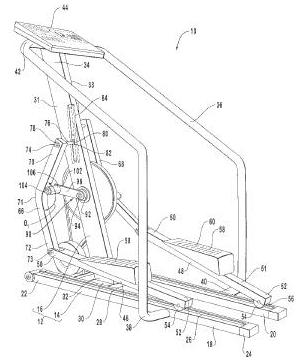 Icon alleges that both defendants infringe on both of the patents through the manufacturing, importing, and/or sale of the Octane Fitness Q47 Series exercise device. “The conduct of [Defendants] as set forth hereinabove gives rise to a claim for infringement of the Asserted Patents, pursuant to at least 35 U.S.C. §§ 271 and 281. Icon also asserts that it “is entitled to injunctive and monetary relief against [defendants], pursuant to 35 U.S.C. §§ 283, 284, and 285. The case is titled Icon Health & Fitness, Inc. v. Octane Fitness, LLC, et al., SACV 08-00437 CJC (C.D. Cal. 2008).
Icon alleges that both defendants infringe on both of the patents through the manufacturing, importing, and/or sale of the Octane Fitness Q47 Series exercise device. “The conduct of [Defendants] as set forth hereinabove gives rise to a claim for infringement of the Asserted Patents, pursuant to at least 35 U.S.C. §§ 271 and 281. Icon also asserts that it “is entitled to injunctive and monetary relief against [defendants], pursuant to 35 U.S.C. §§ 283, 284, and 285. The case is titled Icon Health & Fitness, Inc. v. Octane Fitness, LLC, et al., SACV 08-00437 CJC (C.D. Cal. 2008).
Los Angeles, CA: Trademark And Copyright Attorneys For Guru Denim/True Religion Apparel Sue To Stop Copying Of Jeans And To Protect Against Fakes/Counterfeits
Los Angeles, CA – Trademark and copyright attorneys for Guru Denim, a subsidiary of True Religion Apparel, filed a trademark infringement, copyright infringement, and Lanham Act § 43(a) unfair competition (15 U.S.C. § 1125) complaint at the Federal District Court in Los Angeles to stop copying of its jeans and sales of fakes and counterfeits. Guru Denim has sought copyright, patent, and trademark protection on its garments and jeans. Guru Denim owns U.S. Patent No. D547530 for the stitch pattern applied to True Religion Brand Jeans pants. Guru Denim owns two U.S. Copyright Registrations for the True Religion Brand Jeans Designs, Copyright Certificate of Registration numbers VA1-192-834 and VA1-301-845.
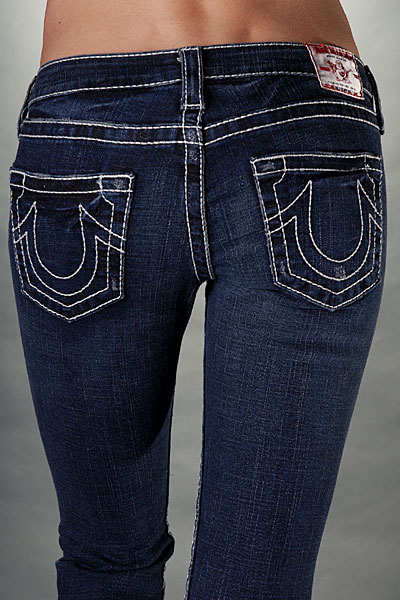 Guru Denim owns a USPTO registered trademark for the “True Religion Brand Jeans World Tour Fashion for the Senses Section Row Seat.” Also, Guru Denim “owns registered United States trademarks in the pocket stitching pattern that appears on True Religion Brand Jeans pants and the overall stitching pattern on the front of True Religion Brand Jeans pants.” Guru Denim also has 4 USPTO registered trademarks for “True Religion Brand Jeans” with assorted designs. Finally, Guru Denim has registered its “True Religion” word marks with the USPTO. Guru Denim’s “line of ‘super-premium’ denim wear, which ranges in retail price from $170.00 to in excess of $300.00, is acclaimed in the fashion industry due to its famous name recognition which represents quality and distinguished craftsmanship. Each piece of clothing or pair of denim distributed under the Mark bears an emblem of a smiling Buddha strumming a guitar and, in some occasions, is elaborately embroidered.”
Guru Denim owns a USPTO registered trademark for the “True Religion Brand Jeans World Tour Fashion for the Senses Section Row Seat.” Also, Guru Denim “owns registered United States trademarks in the pocket stitching pattern that appears on True Religion Brand Jeans pants and the overall stitching pattern on the front of True Religion Brand Jeans pants.” Guru Denim also has 4 USPTO registered trademarks for “True Religion Brand Jeans” with assorted designs. Finally, Guru Denim has registered its “True Religion” word marks with the USPTO. Guru Denim’s “line of ‘super-premium’ denim wear, which ranges in retail price from $170.00 to in excess of $300.00, is acclaimed in the fashion industry due to its famous name recognition which represents quality and distinguished craftsmanship. Each piece of clothing or pair of denim distributed under the Mark bears an emblem of a smiling Buddha strumming a guitar and, in some occasions, is elaborately embroidered.”
Guru Denim discovered that numerous defendants were selling allegedly fake and counterfeit jeans on their Websites. The complaint asserts that Guru Denim’s investigator purchased a True Religion pair of jeans from the denimbutt.com website for $129.00 plus a shipping cost of $1.95, where the defendant causes confusion by claiming that it is “committed to selling only first-quality, genuine designer fashions (sic) items, clothes and accessories.” The complaint continues that Guru Denim’s “inspection of the purchased item using security measures confirmed that the item Defendants sold to the investigator was in fact a counterfeit pair of True Religion Brand Jeans denim pants.”
Trademark Attorneys For Professional Photographers’ Association Sued A Competitor For Infringement Of USPTO Registered Trademarks “Image USA” and “Image Expo” Used For Trade Show Services
Los Angeles, CA – Trademark attorneys for Professional Photographers of America, Inc. filed a trademark infringement and unfair competition lawsuit at the Federal District Court in Los Angeles, alleging infringement of Professional Photographers’ USPTO registered trademarks for Imaging USA and Imaging Expo. The complaint states that since 1999, Professional Photographers has used the Imaging USA trademark for trade shows in the field of professional photography and has used the Imaging Expo trademark since 2004 for trade shows.
 Plaintiff asserts that Defendant “Rangefinder intends to use the designation World Imaging Expo for tradeshows in the field of professional photography” and that Plaintiff became aware of the competing tradeshow when it discovered a copy of the World Imaging Expo convention program guide. Professional Photographers also discovered that Rangefinder had filed an intent-to-use trademark application with the USPTO. Professional Photographers asserts that it sent a cease and desist letter to Rangefinder over the use of the World Imaging Expo trademark, but Rangefinder refused to withdraw its pending trademark application or stop using the trademark. Thus the complaint was filed asserting causes of action for federal trademark infringement under 15 U.S.C. § 1114, false designation of origin and false representation under 15 U.S.C. § 1125(a), and unfair competition under California common law and statutes. The case is titled Professional Photographers of America, Inc. v. Rangefinder Publishing Co., CV08-02324 SVW (C.D. Cal. 2008).
Plaintiff asserts that Defendant “Rangefinder intends to use the designation World Imaging Expo for tradeshows in the field of professional photography” and that Plaintiff became aware of the competing tradeshow when it discovered a copy of the World Imaging Expo convention program guide. Professional Photographers also discovered that Rangefinder had filed an intent-to-use trademark application with the USPTO. Professional Photographers asserts that it sent a cease and desist letter to Rangefinder over the use of the World Imaging Expo trademark, but Rangefinder refused to withdraw its pending trademark application or stop using the trademark. Thus the complaint was filed asserting causes of action for federal trademark infringement under 15 U.S.C. § 1114, false designation of origin and false representation under 15 U.S.C. § 1125(a), and unfair competition under California common law and statutes. The case is titled Professional Photographers of America, Inc. v. Rangefinder Publishing Co., CV08-02324 SVW (C.D. Cal. 2008).
PRACTICE NOTE: A proposed trademark does not have to be identical to another party’s previously registered or used trademark in order to prove infringement. If there is going to be a “likelihood of confusion” between the two trademarks, a Court will enjoin the junior trademark owner’s use of the “confusingly similar” trademark. For example, the trademark Red Shield for insurance services was held to be confusingly similar with the previously registered Blue Shield® trademark.
Los Angeles Patent Infringement Lawsuit Filed By Attorneys For Real Estate Alliance Regarding Its Internet Patents Covering Locating Available Real Estate Properties
Los Angeles, CA – Patent attorneys for Real Estate Alliance, LLC (“REAL”) filed a patent infringement lawsuit, at the Federal District Court in Los Angeles, accusing real estate websites www.loopnet.com and www.cityfeet.com of infringing on U.S. Patent No. 4,870,576 and U.S. Patent No. 5,032,989. “The Patents describe methods for locating available real estate properties for sale, lease, or rental using a database of available properties, and displaying the approximate location of such properties on a map of an area of interest. The Patents describe zooming in on an area of interest, displaying the approximate locations of available properties within the zoomed area, and, among other things, identifying information about the available properties in that area.”
Although this concept seems commonplace today, the complaint alleges that when the inventions were made in 1986, “personal computers were in their infancy; the Internet was virtually unheard of.” The Complaint asserts that “LoopNet has infringed, and continues to infringe, the Patents by using the patented methods to display on zoom-enabled maps on its website the locations of millions of available commercial real estate property listings. LoopNet enables property owners and commercial real estate agents – on behalf of property owners and landlords – to list properties for sale or for lease and submit detailed information on property listings, such as qualitative descriptions, financial and tenant information, photographs, and key property characteristics, in order to find a buyer or tenant. Commercial real estate agents, buyers, and tenants use the LoopNet online marketplace to search for available property listings.” In addition to preliminary and permanent injunctions, the complaint seeks monetary judgments against both defendants. The case is titled Real Estate Alliance, Ltd., v. Loopnet, Inc., CV 08-02321 CAS (PLAx) (C.D. Cal. 2008).
 Los Angeles Intellectual Property Trademark Attorney Blog
Los Angeles Intellectual Property Trademark Attorney Blog


